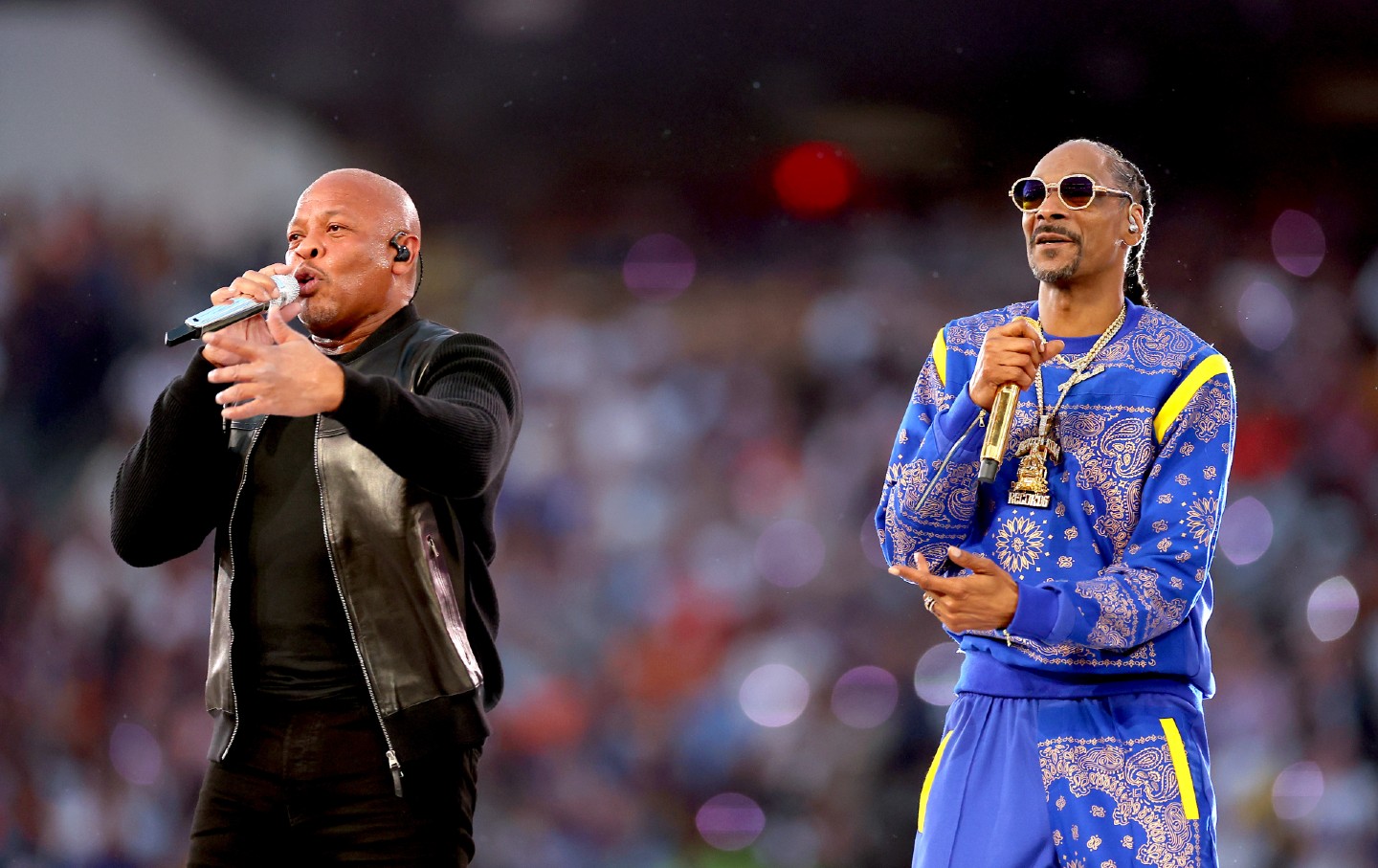
Dr. Dre and Snoop Dogg perform during the Pepsi Super Bowl LVI Halftime Show at SoFi Stadium on February 13, 2022, in Inglewood, Calif.(Photo by Kevin C. Cox / Getty Images)
The game was the game, with the Los Angeles Rams eking out a 23-20 victory over the underdog Cincinnati Bengals and becoming Super Bowl champions at their home stadium in Inglewood, Calif. Like the last six remarkable NFL playoff games, this one came down to the final minute. The league has had a ridiculous run of good luck in the quality of these nail-biting contests, proving the old axiom that running an NFL franchise is like being a bartender during spring break: You have to be epically incompetent to lose money.
But the halftime show perhaps contained more drama than the game itself. Brought to you by Jay-Z’s Roc Nation, it was Dr. Dre, Snoop Dogg, Eminem, Kendrick Lamar, 50 Cent, and Mary J. Blige. It was the first time hip-hop had taken center stage at the Super Bowl. I am in the age range that the NFL was courting with these older acts, and at times it was majestic. You had to pinch yourself: hip-hop produced by Dre brought straight from the Southern California that made him.
And yet it was also, as the philosopher Cornel West noted, a missed opportunity. West wrote on Facebook, “The #SuperBowl halftime performance displayed our great Black musical tradition! But it was also a missed opportunity for truth-telling about Brian Flores’ challenge to the NFL’s plantation system.… the political silence of our artists was sad!”
This is the NFL, a league that colluded against and expelled Colin Kaepernick for taking a knee against racist police violence and is now embroiled in a racial discrimination lawsuit brought by recently fired Miami Dolphins head coach Flores. It is a league with zero Black ownership and a scant number of Black executives. It is a league that projects Black excellence under the thumb of white authority. But it is also a league that needs hip-hop. The future of the league, as Commissioner Roger Goodell well knows, is not among aging white people with a hankering for insurrection. It needs to connect with a young generation of fans well known to be more demographically diverse and less tolerant of bigotry than any generation in this country’s history. The NFL is so desperate to “move past Kaepernick” and show that it isn’t this lumbering dinosaur of racist energy that it handed over its halftime program to Jay-Z and Dre. Herein lies the missed opportunity that Dr. West referenced.
The stage was theirs. Yet, other than Eminem’s taking a knee, which may or may not have been sanctioned by the NFL, this was a politics-free zone. In fact, the entire show, with thumping iconic bass lines and its political emptiness, hit the note that Goodell was aiming for. It upset right-wingers whose online fuming then provoked some of the league’s biggest critics to defend hip-hop, and defend the choice of Dre to helm the halftime show, and implicitly help make the league look like it had made a brave choice and was, for once, on the right side of history.
What was needed was some form of recognition that hip-hop inherently has a political history: It’s a musical art form that was once something that you didn’t either “like” or “dislike” but were either “for” or “against.” This was made all the more frustrating by the fact that there are lyrics in many of the songs they played that would have pushed boundaries. They just didn’t perform them. Lamar did an edited, family-friendly, police-friendly version of the BLM anthem Alright, and that’s about as close as it got to anything—other than 50 Cent’s dancers—that would have upset those to the right of Trump’s former press secretary Sean Spicer. Hip-hop is such a diverse art form that it doesn’t have to be political. But at this moment in the NFL, it could be argued that Dre was fulfilling the dream scenario of the league: He helped project this vital creation of Black culture in a way that obscured anti-Black discrimination. As the saying goes, the league was loving the rhythm but hiding the blues.
I don’t think West or any of the show’s critics are saying the performers should have canceled the show to do a sit-in at the 50-yard line. But the failure to recognize the gap between what was being celebrated and the realities behind the scenes does feel like a missed opportunity. It was the living example of Jay-Z’s infamous statement in 2019 that the NFL needed to “move past kneeling” and basically put money in his pocket to produce these halftime shows, while it was keeping Kaepernick from employment. Based upon the Flores lawsuit, this is a league that needs more acts of protest and dissent, not fewer. This is a league that needs to shine a light on its own leadership and show the practitioners of discrimination the door. Instead, the halftime show, courtesy of Jay-Z, only granted it more time in the shadows.
Dave ZirinDave Zirin is the sports editor at The Nation. He is the author of 11 books on the politics of sports. He is also the coproducer and writer of the new documentary Behind the Shield: The Power and Politics of the NFL.